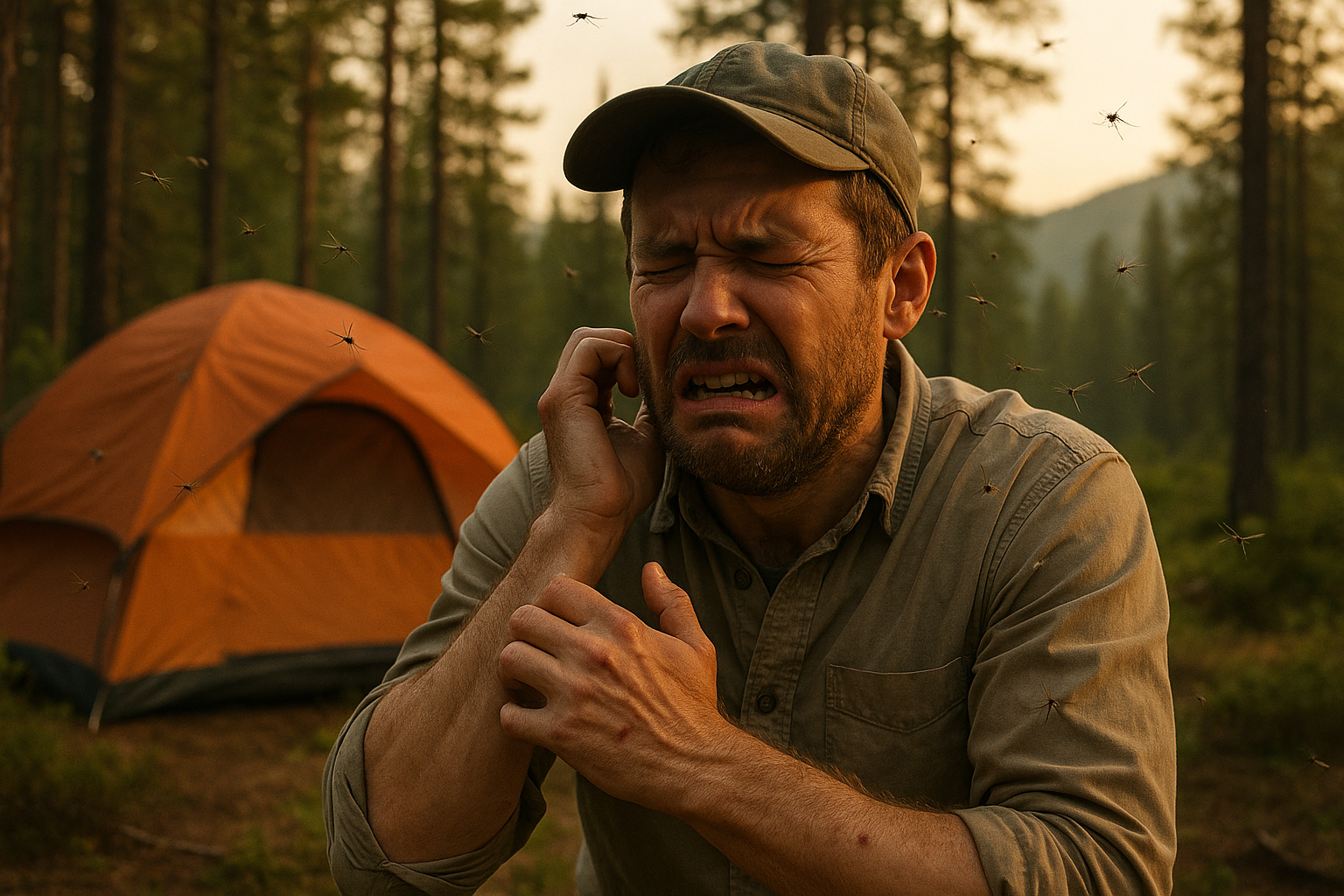Table of Contents: Best Solutions for Dealing with Bugs
As an Amazon Associate I earn from qualifying purchases.
There’s nothing quite like stretching out under a blanket of stars, the comforting crackle of the campfire lulling you into that sweet, peaceful hum of the wilderness. The pine-scented breeze whispers through the trees, and for a moment, everything feels right. But then, you feel it—the sharp zing of a mosquito landing on your cheek, the ticklish creep of an ant across your hand, and the sickening realization that your perfect night might be hijacked by nature’s uninvited guests.
I remember one night when I was halfway into roasting marshmallows when a mosquito bit right through my shirt, leaving me scratching and swatting in frustration. It’s enough to make you want to pack up early. That’s why I’ve handpicked these 10 best solutions for dealing with bugs—gear I’ve tried and trusted to turn a buggy nightmare into a peaceful escape. Get ready to reclaim your campsite.
🦟 1️⃣ Thermacell MR450 Armored Portable Mosquito Repeller
Thermacell Mosquito Portable Repeller; Includes 12-Hour Refill; 15 Foot Zone of Protection; Highly Effective Mosquito Repellent; Deet Free Bug Spray Alternative; Scent Free
- MOSQUITO PROTECTION THAT WORKS: Thermacell effectively keeps mosquitoes up to 15FT away. Works fast, get max protection in 15 minutes. Easy to use. Portable device is ideal for backyard, camping, fishing, hunting and more.
- EFFECTIVE 15FT ZONE TECHNOLOGY: Engineered to precisely diffuse repellent, creating a 15-foot zone of mosquito protection. Consistent repellent protection won’t weaken over time. Powered by a safe and compact fuel cartridge.
- REPEL MOSQUITOES IN AIR, NOT ON YOUR SKIN: Repel mosquitoes without DEET sprays or lotions on your skin. Unscented repellent mats last up to 4 hours each and change color when time to replace. No smoke, no flame and easy to refill.
List Price :
Offer: 27.99
Go to AmazonThis compact, portable device creates a 15-foot zone of protection against mosquitos, black flies, and no-see-ums. No sprays, no open flames—just a quiet repeller powered by heat-activated repellent mats. It’s perfect for creating a bug-free zone around your campsite, picnic table, or tent entrance.
🛠️ Pro Tip: Position one unit near your cooking area and another near your sleeping setup for comprehensive coverage.
🦟 2️⃣ Sawyer Products Premium Permethrin Clothing Insect Repellent
Sawyer Products SP657 Premium Permethrin Insect Repellent for Clothing, Gear & Tents, Trigger Spray, 24-Ounce
- Permethrin spray bonds to fabric fibers for up to 6 weeks or through 6 washings (whichever comes first) won’t stain or damage clothing, fabrics, plastics, finished surfaces, or outdoor gear; fragrance free
- Reduce likelihood of a tick bite by 73.6 times by treating shoes and socks with Permethrin (University of Rhode Island study – 2017); maximize protection by pairing with Sawyer Picaridin topical repellent for the skin
- Add a layer of protection to your clothing and gear with Permethrin insect and tick repellent spray — perfect for use on shirts, jackets, pants, socks, shoes, boots, sleeping bags, tents, netting, when outdoors, camping, hunting, or on travel
New starting from: 17.95
Go to AmazonPermethrin-treated clothing offers long-lasting protection against ticks, mosquitos, and biting flies. This spray can be applied directly to clothes, shoes, and gear, lasting up to 6 weeks or 6 washes.
🛠️ Pro Tip: Pre-treat socks, pants, and jackets before your trip. Focus on cuffs and waistlines where insects love to crawl in.
🦟 3️⃣ Coleman Citronella Candle with Tin
Coleman Outdoor Citronella Candle, Decorative Tin Candle for Patio, Backyard, Camping, and Outdoor Use, Includes Lid for Protection, Up to 25 Hours Burn Time, 11oz
- TRAVEL-FRIENDLY DESIGN: Perfect for outdoor adventures like camping, RV trips, and hiking, providing a portable and convenient solution for your outdoor ambiance needs
- SCENTED CITRONELLA: Enjoy the refreshing and calming citronella fragrance that helps boost the atmosphere of your patio, backyard, or campsite without overpowering scents. Ideal for outdoor relaxation
- LONG-LASTING BURN: Featuring a single wick, this 11 oz decorative tin candle provides up to 25 hours of burn time, making it a reliable and extended solution for your outdoor lighting needs
New starting from: 8.99
Go to AmazonThese compact, travel-friendly candles combine the calming glow of candlelight with the natural bug-repelling properties of citronella. Each tin burns for up to 25 hours, providing continuous protection during evenings by the campfire.
🛠️ Pro Tip: Place multiple candles around your seating area to create a perimeter of light and scent that insects dislike.
🦟 4️⃣ Sawyer Products Picaridin Insect Repellent Lotion
Sawyer Products SP564 Premium Insect Repellent with 20% Picaridin, Lotion, 4-Ounce
- Non-greasy, fragrance free, odorless; Dries quickly and won’t damage plastics or synthetic coatings — safe for use on clothing, backpacks, watches, sunglasses, fishing line, firearm finishes, and more
- Safe for use on the whole family, long-lasting insect and tick repellent lotion deters a wide variety of pests — up to 14 hours against mosquitoes and ticks and up to 8 hours against flies, gnats, and chiggers
- Fragrance-free topical insect repellent with 20% Picaridin — more effective at repelling biting flies than DEET; repels disease-spreading ticks (Lyme, tick-borne encephalitis) and mosquitoes (West Nile, Dengue, and Zika viruses), chiggers, and more
List Price :
Offer: 8.19
Go to AmazonPicaridin offers superior protection to DEET while being less greasy and more pleasant-smelling. This lotion repels mosquitos, ticks, biting flies, and gnats for up to 14 hours. It’s perfect for hands, necks, and exposed skin areas.
🛠️ Pro Tip: Apply liberally to pulse points and reapply after sweating heavily.
🦟 5️⃣ Coghlan’s Mosquito Netting
Coghlan's Mosquito Netting
- Lightweight and breathable polyester mesh: Designed for portability and airflow, this fine mesh netting keeps insects out while ensuring comfort—ideal for camping, picnics, and backyard lounging.
- Effective insect protection (180 holes/sq. in.): Provides a reliable barrier against mosquitoes, gnats, and other small bugs, perfect for outdoor adventures or indoor use.
- Reusable and washable design: Easy to clean and maintain, this mosquito net offers long-term value for frequent campers, travelers, or anyone needing consistent bug protection.
List Price :
Offer: 4.01
Go to AmazonProtect your tent’s entrance or dining area with this durable, fine mesh netting that keeps out even the tiniest bugs. Easy to hang with guy lines or poles, it’s a must-have for creating a screened dining area or additional tent layer.
🛠️ Pro Tip: Use clothespins or clips to secure the netting to natural branches or a clothesline for a quick setup.
🦟 6️⃣ OFF! Deep Woods Insect Repellent Aerosol
OFF! Deep Woods Insect Repellant Spray, 6 Ounce (Pack of 3)
- Formulated with 25% DEET Provides up to 8 Hours of Protection against Mosquitoes
- Aerosol Spray allows for easy application in a Continuous Sweeping Motion
- Ideal for Camping, Fishing, Hiking, and Hunting
New starting from: 26.7
Go to AmazonWhen the bugs are relentless, nothing beats a trusted DEET formula. OFF! Deep Woods provides up to 8 hours of protection against mosquitoes, ticks, chiggers, and more.
🛠️ Pro Tip: Spray on clothing and exposed skin before hiking, and reapply as needed based on conditions.
🦟 7️⃣ Bug Zapper Racket – Zap It!
ZAP IT! Bug Zapper Battery Powered (2xAA Included) Bug Zapper Racket, 3,500 Volt
- Effective Insect Elimination: Featuring a 3,500-volt grid, our fly swatter electric zapper instantly eliminates mosquitoes, flies, and other pests in a single swing, providing reliable results
- Compact and Portable Design: Lightweight and easy to carry, this zapper is ideal for outdoor activities; whether at backyard parties, barbecues, camping, or hiking, tackle swarming insects with ease
- Ready to Use Convenience: Each electric bug swatter comes with two AA batteries included; simply remove the activation paper on the back of the racket to start using it right out of the box
New starting from: 21.99
Go to AmazonThis rechargeable electric racket lets you swat and zap flying insects mid-air. It’s lightweight, portable, and satisfying to use—especially around campfires and meal prep areas.
🛠️ Pro Tip: Keep it nearby during evening hours and challenge friends to a bug-zapping contest.
🦟 8️⃣ Combat Max Ant Killing Gel
Combat Indoor and Outdoor Ant Killing Gel, 27 Gram
- Helps get rid of ants in just 3 to 5 days
- Best used in cracks and crevices where ants enter the home
- Eliminates the entire ant colony
List Price :
Offer: 4.88
Go to AmazonAnts can invade tents, food bags, and cooking areas. This easy-to-apply gel bait targets ant colonies directly. It’s discreet and effective, perfect for setting up a defensive perimeter around your camp.
🛠️ Pro Tip: Place small dabs near known ant trails but away from food-prep zones.
🦟 9️⃣ Cliganic Mosquito Repellent Bracelets
Cliganic 10 Pack Mosquito Repellent Bracelets, DEET-Free Bands, Individually Wrapped (Packaging May Vary)
- Packaging May Vary – New Look, Same Great Product. You may receive either packaging during the transition
- DEET-Free & Powered By Essential Oils – Active ingredients derived from plants
- Instant & Convenient – 10 individually-wrapped bracelets help keep mosquitoes away
List Price :
Offer: 9.99
Go to AmazonFor campers who prefer a chemical-free option, these DEET-free, essential oil-infused bracelets offer a light, pleasant scent while keeping mosquitoes away. Perfect for children or sensitive skin.
🛠️ Pro Tip: Double up by wearing one on each wrist or ankle, especially during dawn and dusk.
🦟 🔟 Thermacell E-Series Rechargeable Mosquito Repeller
Thermacell Mosquito Repeller E-Series Rechargeable with 20' Mosquito Protection Zone; Up to 9-Hr Battery Life; Includes 12-Hr Refill; Flame or Scent; DEET-Free Bug Spray Alternative
- MOSQUITO PROTECTION THAT WORKS: Thermacell effectively keeps mosquitoes up to 20FT away. Works fast, get max protection in 15 minutes. Easy to use. Portable device is ideal for backyard, poolside, patio, and beyond. Allowed to bring on airplanes.
- EFFECTIVE 20FT ZONE TECHNOLOGY: Engineered to precisely diffuse repellent, creating a 20-foot zone of mosquito protection. Consistent repellent protection won’t weaken over time. Rechargeable lithium-ion battery works for 9 hours.
- REPEL MOSQUITOES IN AIR, NOT ON YOUR SKIN: Repel mosquitoes without DEET sprays or lotions on your skin. Long lasting repellent cartridges are easy to replace. Scent-free, no smoke, no flames.
List Price :
Offer: 31.81
Go to AmazonThis high-tech option offers scent-free, mess-free mosquito protection, powered by a rechargeable lithium battery. It creates a 20-foot mosquito-free zone with no sprays or flames. Ideal for long nights around the campfire or when camping near water.
🛠️ Pro Tip: Pair it with a backup refill cartridge to extend protection.
🏕️ Conclusion: Pack Smart, Camp Bug-Free
I’ll be honest—there’s nothing more frustrating than finally settling into the wilderness, only to spend the night swatting at mosquitoes and scratching bites. Trust me, I’ve been there, and I almost packed it in early more than once. That’s why I always come prepared. These Amazon finds aren’t just some random list—they’re a mix of high-tech gadgets, natural fixes, and practical gear upgrades that help me camp without itching, twitching, or retreating to the car.
If you’re tired of surrendering your peace to bugs, let’s fix that. Hit those links above, stock your gear stash, and make your next camping trip about the adventure—not the swatting.











